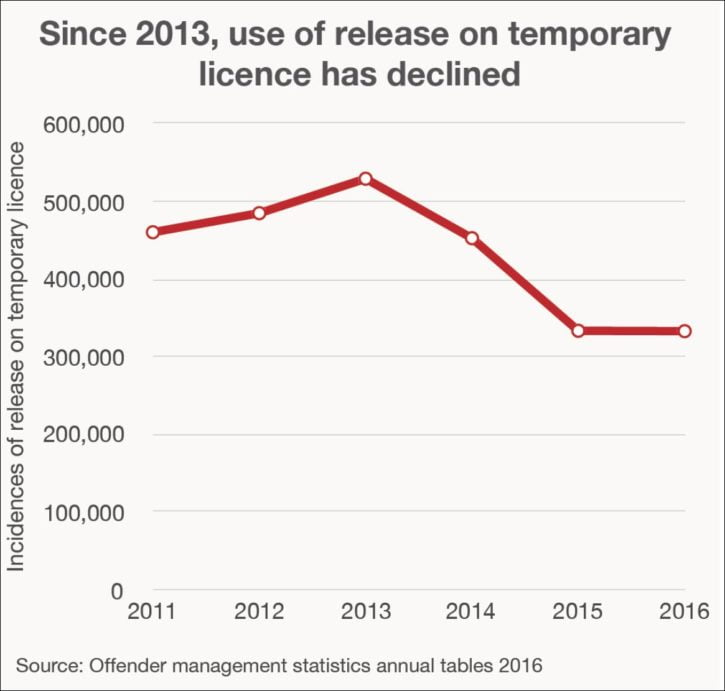More carrot, less stick
Prison governors should be encouraged to empty prison wings during the day and get far more prisoners out on temporary release to engage in work, training and education in the community, a new (11 May 2018) briefing by the Prison Reform Trust (PRT) says.
As part of its forthcoming employment strategy for prisoners, the government should introduce a radical approach to using release on temporary licence (ROTL) at scale across the prison estate. This would be a huge incentive to good behaviour in prison as well as an effective aid to resettlement, the briefing suggests.
ROTL enables people in prison to take responsibility for their own resettlement prior to release by allowing them to sort out work and housing needs and re-establish contact with families. It can also help promote good behaviour in prisons, with young people and staff saying it is one of the most motivating long-term incentives.
Its use benefits victims, with a proportion of the wages earned by prisoners on ROTL release paid into a victim’s fund. Last year alone, the scheme raised £1.1m for victims.
The scheme has a remarkable track record of success, with less than 0.1% of releases on temporary licence resulting in failure. In 2016, there were just 17 failures as a result of alleged further offending—the equivalent of 5 arrests per 100,000 releases.
But despite its many benefits, use of ROTL has fallen markedly in recent years. Between 2013 and 2016, following changes to the policy introduced by the former Justice Secretary Chris Grayling, incidences of ROTL out of prisons in England and Wales fell by one third.

Use of ROTL also varies significantly across the prison estate. Most ROTL releases are authorised from the open estate which predominantly hold people serving indeterminate or long determinate sentences. This means that most prisoners in resettlement prisons are denied the opportunity to work or volunteer in the community prior to release.
The current justice secretary David Gauke promised to look at the availability and use of release on temporary licence to get more prisoners into work and training in a in speech to the Royal Society of Arts at the beginning of March.
Specifically, I want to see how we can use ROTL to allow those prisoners, who have earned it, to have a routine where they, with close monitoring, leave prison each day to go to work nearby.
David Gauke Tweet
An employment strategy for prisoners is imminent and is expected to include proposals to give prison governors more discretion in the use of ROTL.
As part of a radical approach to incentivise prison governors to increase the use of ROTL, the briefing recommends a presumption that prisoners in resettlement prisons should benefit from ROTL, subject to first achieving a period of negative drug tests.
It also recommends monthly benchmarking of ROTL use, incentives for governors to develop ROTL opportunities, and technical changes to the existing ROTL policy.
Commenting, Peter Dawson, Director of the Prison Reform Trust, said:
“ROTL has the potential to be a massive incentive for good behaviour as well an effective tool for resettlement. But to work, governors need a clear and unequivocal message that they will be supported and encouraged in its use. Carefully managed risk in the short term will deliver a long term dividend in better resettlement and public protection.”









2 Responses
I think more prisoners should be released on ROTL. I have worked as an Employment Support Worker getting prisoners jobs for the last five weeks of their sentence. The success rate was phenomenal and I would say 80% of the prisoners went on to have a permanent job on their release.
If this way or working could be rolled and in more of our prisons it would help prisoners to keep out of prison as having no job and o home are the two main contributing factors of recidivism.
Thanks for your comment Deborah. Fortunately, ROTL is on the rise again – absolutely key to having a fighting chance of going straight on release.